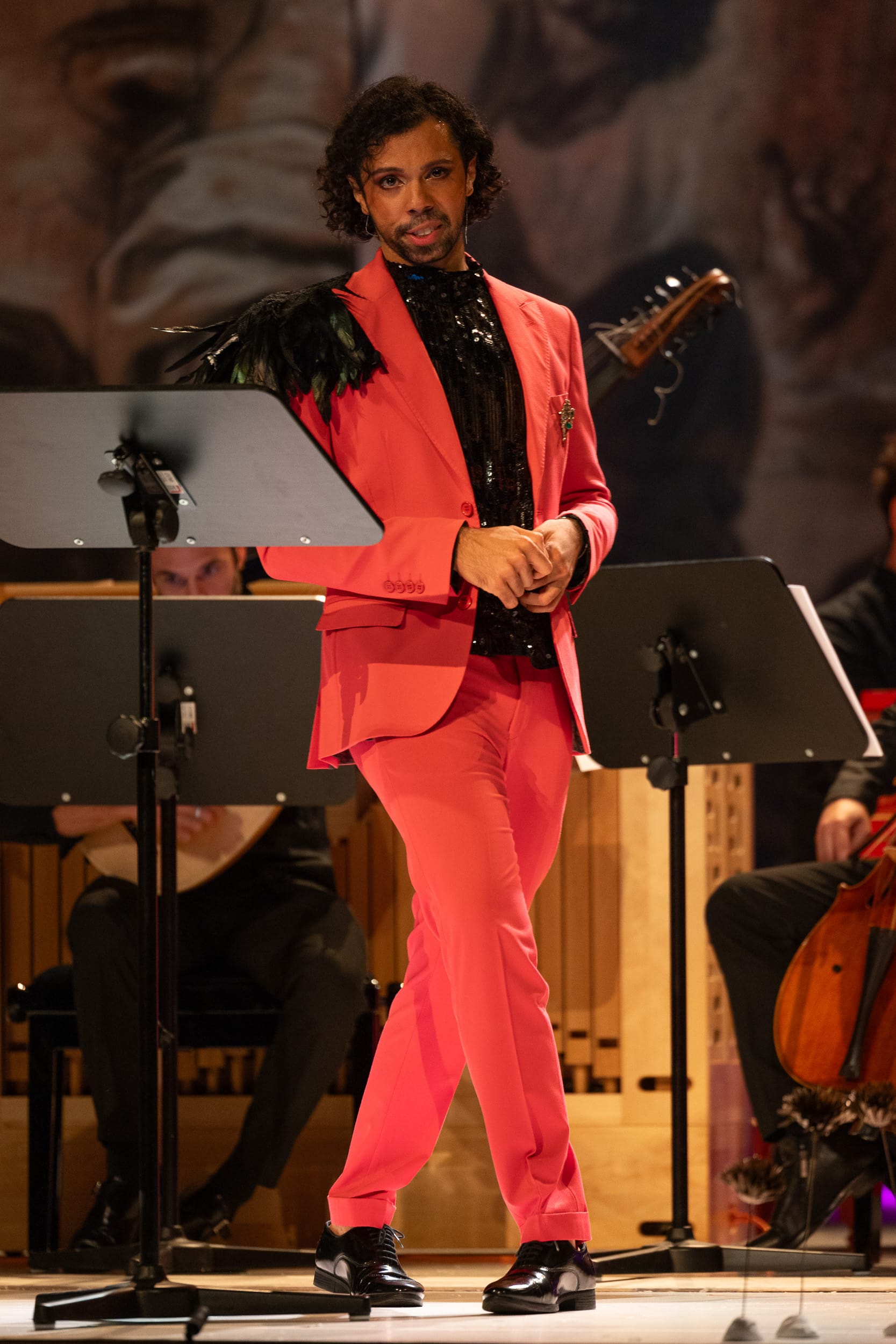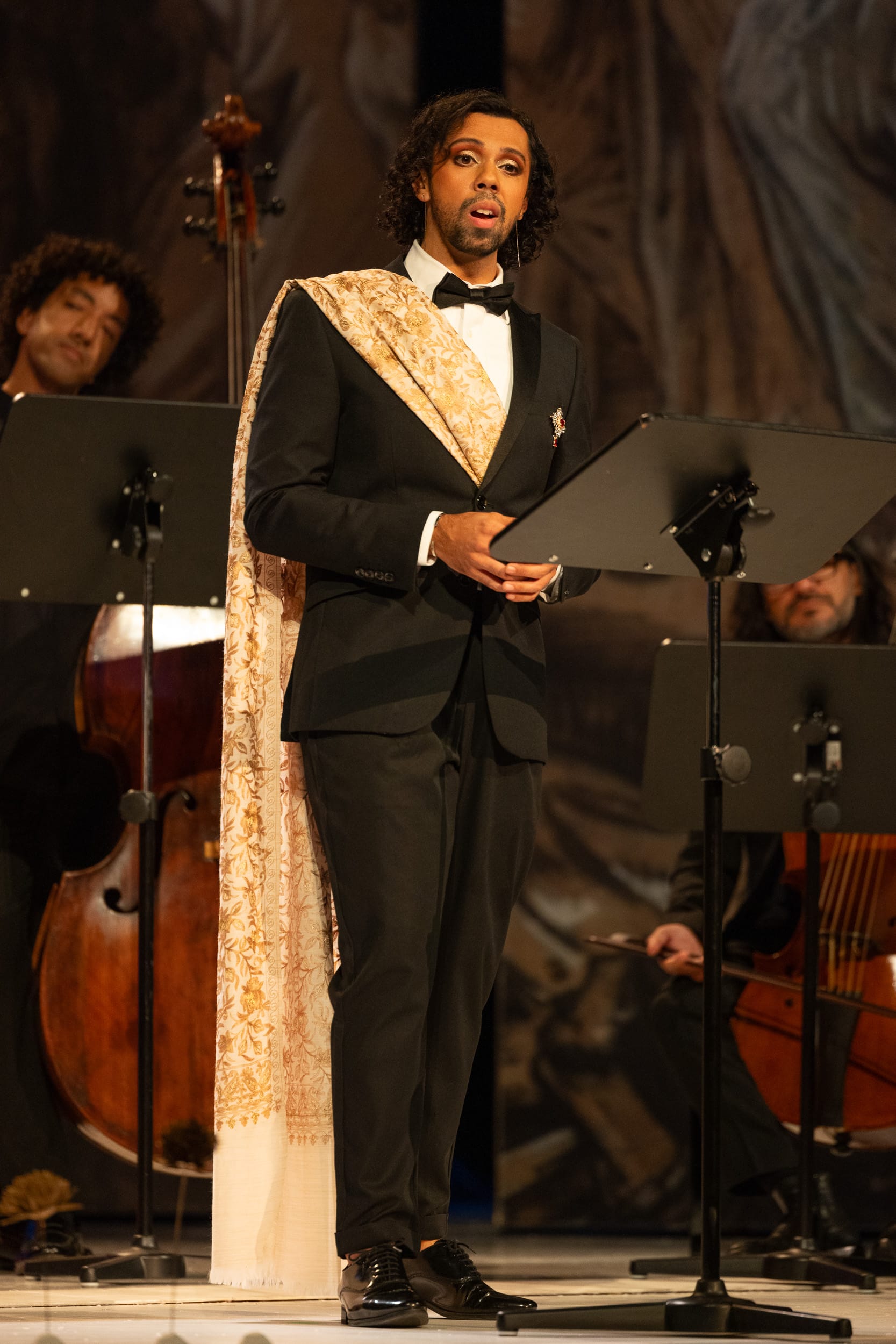
Bayreuth Baroque Gala Concert: Bruno de Sá; Il Pomo d’Oro / Alfia Bakieva (violin / director). Markgräfliches Opernhaus, Bayreuh, 06.09.2024
Handel Gloria in Excelsis Deo, HWV deest (1706/07?)
Vivaldi In furoe iusissimae irae, RV 626 (1720s)
Handel Aci, Galatea e Polifemo, HWV 72 (1708): Qui l’angel
Hasse Marc’Antonio e Cleopatra (1725): Un sol tuo sospiro
Porpora Germanico in Germania (1732): Parto ti lascia
Vivaldi L’Olimpiade, RV 725 (1734): Siam navi all’onde algenti
Stepping in for an indisposed Jakub Józef Orliński at short notice, male soprano Bruno de Sá offered a somewhat disappointing substitute experience. De Sá had underwhelmed in Versailles in April 2023 (review), and indeed the delights of the present varied programme tended to stem from the orchestra, the top-flight group Il Pomo d’Oro, here directed from the violin by Alfia Bakieva. Listening to their verve in the opening of Handel’s Gloria in Excelsis Deo was incredibly energising; the contrastive passage ‘Et in terra pax’ section caried great weight. The problem was de Sá’s rather tremulous approach, coupled with a markedly weak low soprano register.
The appellation ‘deest’ in the catalogue number for that Gloria refers to a work that was missing from the main Handel Werk Verzeichnis (Handel Work Catalogue, literally translated); it was rediscovered in the library of the Royal Academy of Music in 2001 (‘deest’ is an inflected form of the Latin ‘desum,’ meaning ‘missing’). The Gloria’s date remains uncertain, but possibly it is around the 1706 or 1707 mark. To turn our attention to the present performance, the tempo change at ‘Gratias’ during the ‘Laudamus te’ was very well managed here; but the ‘Domine Deus, Rex coelestis’ could have been more profound; it leads, after all, into a decidedly lachrymose ‘Qui tollis’. The ‘Quoniam,’ in contrast, is joyous, and certainly was from Il Pomo d’Oro, but de Sá seemed rather weak-powered.

One of three surviving solo motets of soprano composed by Vivaldi in Rome, In furore iustissimae irae is full of contrasts and boasts a fearsomely energetic opening from the strings (after which the soloist embarks on truly virtuoso roulades). The layers of expression in the second aria, ‘Tunc meus fletus,’ are innumerable. Il Pomo d’Oro realised this, but de Sá seemed less involved. That aria is the clear focus of the motet; a short ‘Alleluia’ rounds off the piece, certainly impressive technically but just shy of that particularly Vivaldian sense of exultation it requires.
After the interval, more Handel: ‘Qui l’angel.,’ Aci’s aria from Handel’s Italian setting of the Acis myth (the English one is more famous, although I have previously reported on two full performances of the Italian, one by the Orchestra of the Age of Enlightenmenrat Cadogan Hall in January 2022, the other from Piacenza via OperaStreaming in November 2020). The title of the aria is more often rendered in a fuller form as ‘Qui l’angel da pianta in pianta’ and the aria itself features an obbligato oboe; the last-minute programme sadly did not credit the oboist, but his echo was violinist Alfia Bakieva. The piece requires a ‘third obbligato’ in some passages, the solo voice, and it did not quite work here; the sense of give and take was just absent.
There is something Vivaldian about the energy of the opening of Hasse’s ‘Un sol tuo sospiro’ (Cleopatra’s aria from the opera Marc’Antonio e Cleopatra). If the word ’sospiro’ might imply lachrymose sighs, the truth is far different. the vocal part is certainly agile (and de Sà certainly has a fine trill) but most intriguing is the soloist’s interactions – duetting – with the violin. This was a reminder of the fertile invention of Johann Adophe Hasse, and that we need to hear more of his music. A recording of the full opera, incidentally, is available on Deutsche Harmonia Mundi with Le Musiche Nove and Claudio Osele. Here’s de Sá in another live performance in just this aria:
Some may know ‘Parto ti lascio,’ Arminio’s aria from Porpora’s opera Germanica in Germania, via Cecilia Bartoli, who has done great things for lesser-known repertoire:
This really is a slow and expressive aria, and acted as an unscheduled pre-echo of the Porpora opera the very next night (Ifigenia in Aulide). Interestingly, the first complete recording of this opera was released on Decca in 2018 and features Max Emanuel Cenčić, who directed and sang in Ifigenia.
Finally, Aminta’s aria ‘Siam navi all’onde algenti’ from Vivaldi’s L’Olimpiade, an opera last heard (in full) courtesy of Irish National Opera at Covent Garden’s Linbury Theatre only this May (review: Rachel Redmond sang Aminta there). The piece is magical: the voice floats over orchestral waves in the central seciton, while the outer sections provide fireworks aplenty.
In terms of repertoire, this concert cannot be faulted, and Il Pomo d’Oro remains a class act. For all of de Sá’s posturing (and, indeed, glam outfits), it was he who was the weak link in a concert that held so much potential.
Here as a bonus is a full concert of Bruno de Sá with Il Pomo d’ora at Bayreuth Baroque in 2022 (programme listed underneath):
Baroque opera rarities: Arias with Bruno de Sá
00:00:29 – Scarlatti: Sinfonia | Telemaco
00:02:47 – Scarlatti: Dì che sogno, o che delirio | Griselda
00:04:26 – Vivaldi: Senza l’amato ben | Il Giustino
00:10:19 – Vivaldi: Per noi soave e bella | Il Giustino
00:15:26 – Corelli: Triossonata in D minor, op. 3 no. 5
00:22:27 – Arena: Del sen gl’ardori nessun mi vanti | Achille in Sciro
00:27:05 – Porpora: Vorresti a me sul ciglio | Carlo il Calvo
00:30:55 – Cocchi: Timida pastorella | Adelaide
00:38:56 – Hasse: Non mi chiamar crudele | Cajo Fabricio
00:43:40 – Galuppi: Concerto a quattro in D major
00:50:36 – Latilla: Vanne barbaro alle selve | Romolo
00:59:59 – Vivaldi: Sinfonia | Il Faustino
01:05:44 – Piccinni: Furie di donna irata | La buona figliuola
Encores:
01:12:36 – Broschi: Son qual nave ch’agitata | Artaserse
01:21:45 – Bononcini: Ombra mai fu | Xerxes
Bruno de Sa | Sopranist
Il Pomo d’Oro
Conducted by Francesco Corti
Albums by Bruno de Sá include Roma Travestita (Amazon link; iDagio link) and Mille Affetti (Amazon link; iDagio link).










